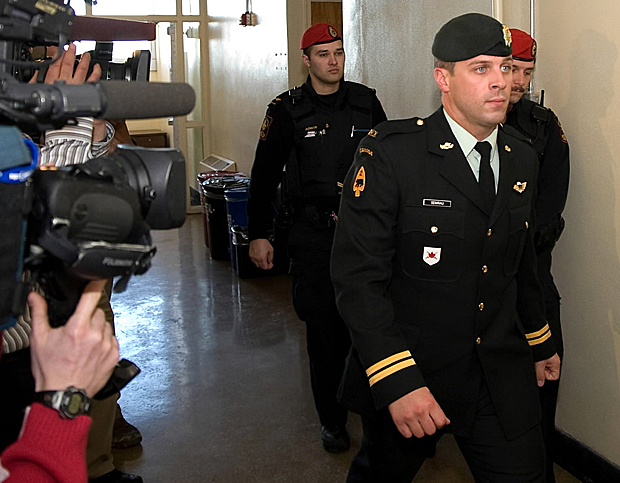OTTAWA – The prosecution and defence presented final arguments Wednesday in the court martial of Canadian Forces Capt. Robert Semrau, accused of murdering a wounded Taliban insurgent on the battlefield in Afghanistan in 2008.
Semrau, 36, of CFB Petawawa, is charged with second-degree murder, behaving in a disgraceful manner and negligent performance of duty.
The prosecution alleges Semrau – the first Canadian soldier to be charged with murder in connection with a battlefield death – fired two tracer rounds into the body of a severely wounded Taliban fighter on Oct. 19, 2008 while on a mission with the Afghan National Army.
Prosecutors have characterized Semrau’s actions as a misguided mercy killing, an act that violated both the Criminal Code and the Canadian Forces Code of Conduct.
At Wednesday’s session in Gatineau, Que., prosecutor Mario Leveillee said the evidence against Robert Semrau, including his own admissions to others, points to his guilt on all charges.
He said the evidence shows that Semrau shot the insurgent twice with his Canadian Forces rifle, that his victim was still alive when he did so, and that the shots were fatal.
"He wanted to cause his death, to end his life, perhaps – perhaps – as an act of so-called mercy," Leveillee said.
But Maj. Steve Turner, Semrau’s defence lawyer, said the prosecution had failed to prove its case beyond a reasonable doubt.
"Our defence is that the prosecution has failed in its burden of proving to you that Capt. Semrau did all of these things," he said.
Turner attacked the credibility of testimony provided by several witnesses, most notably that of Cpl. Steven Fournier, who testified Semrau told him the shooting was a "mercy kill" moments after the event.
But Turner said other witnesses contradicted many elements of Fournier’s testimony, which he described as key to the prosecution’s case.
"We have a number of different stories before us, and they can’t be reconciled," he said.
The judge, Lt.-Col. Jean-Guy Perron, will now prepare his instructions for the four-member military panel that will determine Semrau’s guilt or innocence.
That is expected to take until at least Thursday and perhaps longer. Once the panel has received the judge’s instructions, it will be sequestered in a hotel until it reaches a verdict.
If convicted on the murder charge, Semrau faces a life sentence.
The trial began March 24 and has proceeded intermittently since then, including some sessions in Afghanistan in June.








Comments